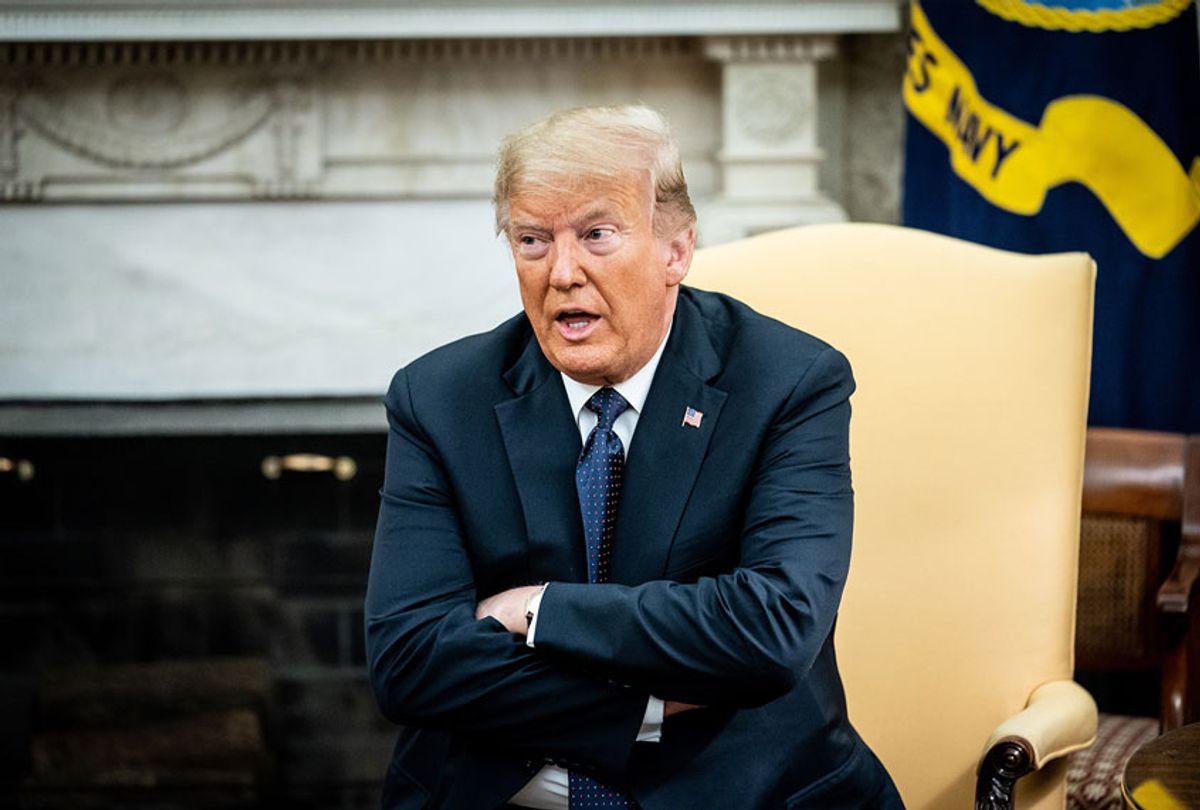The White House on Wednesday formally declared its opposition to proposed legislation to make Washington D.C. the 51st state.
"This bill is unconstitutional because the retrocession of portions of the District of Columbia into a separate state would violate the 23rd Amendment," the Office of Management and Budget (OMB) said in a statement. "This amendment, ratified in 1961, contemplates a District of the proportions then in effect as a basis for the allocation of presidential electors," the statement says, adding, "If H.R. 51 were presented to the president, his advisors would recommend that he veto the bill."
OMB's statement follows President Donald Trump's revealing comments last month on the prospects of D.C. statehood.
"D.C. will never be a state," Trump told The New York Post. "You mean District of Columbia, a state? Why? So we can have two more Democratic—Democrat senators and five more congressmen? No thank you. That'll never happen."
The state would have one, not five congressmen.
The House is expected to vote Friday on H.R. 51, the Washington, D.C. Admission Act.
Proposed by Rep. Eleanor Norton, who represents the district as a nonvoting delegate, the bill has 226 co-sponsors in the House, enough to secure its passage the chamber. Suchlegislation hasn't faced a vote since 1993.
"Neither chamber has passed the D.C. statehood bill in D.C.'s 219-year history," Norton tweeted Tuesday. "This is the beginning of the end of taxation without representation and the start of consent of the governed for D.C. residents."
Recent events are bolstering Norton and other statehood advocates' calls—the coronavirus crisis and the violent dispersal of Black Lives Matter protesters in Lafaytte Square.
Quinta Jurecic discussed the June 1 incident Wednesday at The Atlantic:
D.C.'s lack of statehood, and its unique relationship with the federal government, made this cartoonish show of force possible. Unlike state National Guards, which usually report to their governors, the D.C. National Guard is commanded by the president. Thus Trump could send troops into the district's streets without having to invoke the Insurrection Act, the controversial legal authority he would have needed in order to call up the guard elsewhere in the country—and without requiring the city's consent. The president's control over federal law enforcement also enabled him to deploy heavily armed officers from various agencies across the city—again, without consulting local leadership. The Washington Post reported that the White House even considered seizing control of the D.C. police force, before deciding against it. Trump found in the capital a place that had no recourse against the expansive authority already granted to him and asserted that authority with the delight of a bully.
Co-sponsor Rep. Pramila Jayapal (D-Wash.) framed the issue of statehood—for an area whose population is at least 46% Black—as one of racial justice.
"Make no mistake: one of the many ways our country has silenced Black voices and suppressed Black votes has been by preventing D.C. statehood," she said last week. "D.C. should be a state with two senators and full representation in the House. Congress must act now."
In an interview with Fox News, the district's "shadow senator" Paul Strauss talked about how the lack of statehood affected D.C. residents amid the global health pandemic. From Fox:
Strauss, a Democrat, specifically noted that the federal response to the coronavirus outbreak revealed why the residents of D.C. need statehood for resources. When it came time to allocate funds to help Americans deal with the pandemic, lawmakers treated D.C. as a territory instead of as a state, and Strauss says "we didn't get the resources we needed."
Sen.Tom Carper (D-Del.), who has companion legislation in the Senate, where its fate is dim, said Wednesday that "fairness" is at stake.
"For Americans who may be unsure about whether or not the District of Columbia should be granted statehood, I urge you to think about it this way: think about paying taxes to the federal government and then not having a vote to help determine how that government functions. Imagine the military being sent to your communities to patrol your neighborhoods without approval from the leaders you elect to represent you. That is the current reality for the more than 700,000 Americans living in the District of Columbia," said Carper.
"This is an issue of fairness," he said, "and it is incumbent upon those of us who enjoy the right and the privilege of full representation in Congress to take up the cause of our fellow citizens in the District of Columbia and right this wrong now."



Shares